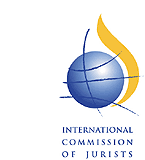ICJ welcome reinstatement of Parliament
The International Commission of Jurists (ICJ) has welcomed the reinstatement of the House of Representatives in Nepal and called on the new transitional Government and the CPN (Maoist) to declare indefinite ceasefires and jointly to sign a human rights code of conduct as one of several confidence-building measures towards peace.
"The reinstatement of parliament is a major step on the long path towards re-esta
 blishing democracy in Nepal and ensuring that democracy is stable and brings benefits to all the people of Nepal", said Nicholas Howen, Secretary-General of the ICJ.
blishing democracy in Nepal and ensuring that democracy is stable and brings benefits to all the people of Nepal", said Nicholas Howen, Secretary-General of the ICJ."Human rights and democracy have been courageously defended by a largely peaceful movement in Nepal. It is essential that the King of Nepal and the Royal Nepalese Army now fully respect the authority of the transitional Government and that the international community remains focused on and supportive of the huge tasks ahead," added Nicholas Howen.
The ICJ urged that a series of confidence-building measures should be taken swiftly, to create an environment in which the remaining questions about how Nepal will be governed can be resolved and in which a negotiated political process can begin to end the 10-year armed conflict.
"The 12-point agreement signed by the Seven Party Alliance and the Maoists in November 2005 sets out many commitments to human rights and the rule of law that should now be put into practice by both the transitional Government and the Maoists", said Nicholas Howen.
Reflecting the need for confidence-building measures that reduce violence and pave the way to a political process, the ICJ urged the Maoists and the Government to declare indefinite ceasefires and to agree a human rights code of conduct, which the Office of the High Commissioner for Human Rights (OHCHR) could be asked to monitor.
The Government should also now move to stop the human rights violations that are being carried out by Nepal's security forces. A start should be made by repealing ordinances issued by King Gyanendra without a democratic process and that infringe on the fundamental rights and freedoms of the people of Nepal, including the Terrorist and Destructive Activities (Control and Punishment) Ordinance, the Media Ordinance, the National Human Rights Commission (First Amendment) Ordinance, the Social Welfare (First Amendment) Ordinance, and the Public Service (Second Amendment) Ordinance.
The ICJ appealed to the CPN (Maoist) to take this opportunity to resolve the conflict through peaceful means and urged the CPN (Maoist) to refrain from imposing any kind of band, strike or other actions that would cause further deterioration to the precarious humanitarian situation in Nepal.
The ICJ also recalled that a process that ensures both that the truth is revealed and accountability is secured for past human rights violations on both sides, will be essential to the future stability of the country and respect for human rights.
The ICJ concluded by urging the international community to continue to support the democratic process in Nepal. "The 12-point agreement between the Seven Party Alliance and the Maoists was also a call on the United Nations and the international community to support the Nepali people as they seek to resolve the conflict, including by monitoring the armed forces of both sides and assisting with mediation and future elections. Now is the time for governments that care about the future of Nepal to show their swift and steadfast support for democracy and human rights," concluded Nicholas Howen.
No comments:
Post a Comment